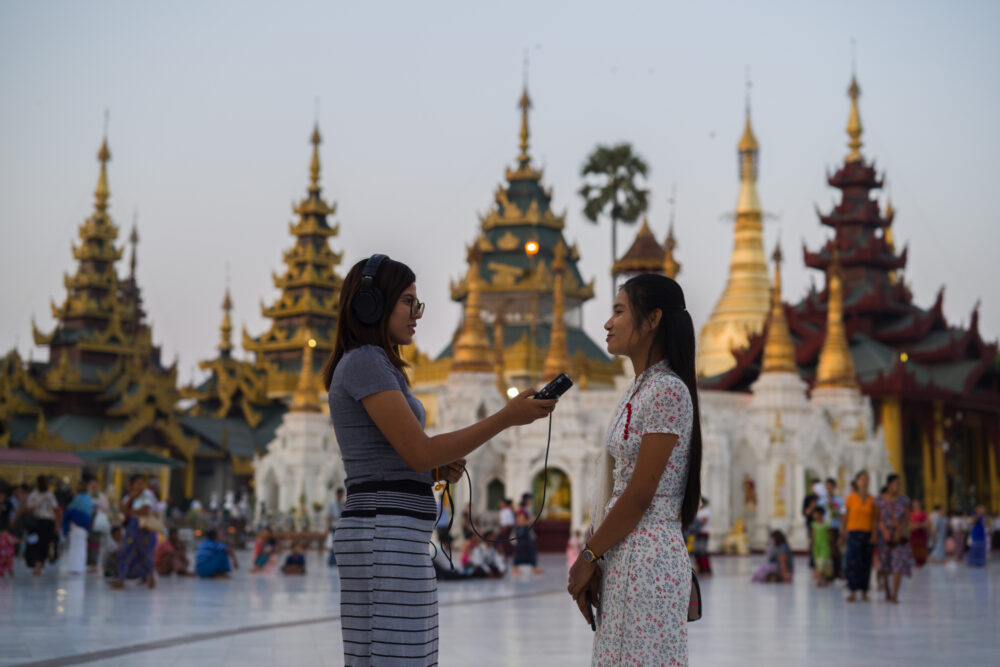QUALITATIVE GROWTH
In 2018, Fondation Hirondelle experienced growth in its activities, thanks to the trust of our partners, the courage and rigour of all our teams present in our eight operations and in Lausanne. Growth is not only quantitative. The quality of our editorial content remains our first concern and the main criterion for measuring our work.
Youth programmes, humanitarian information, regional co-productions: These new activities do not make our mission any easier to implement. There are many obstacles. However, our team spirit has been strengthened and we have been able to collectively design these new activities with creativity and serenity.
This work was not done in isolation. In 2018, we strengthened our partnerships as well as our presence in events and discussion circles that feed our thinking. I invite you to follow us on our social media and website, which are also growing rapidly, to find out more about what we do and stay informed of our news throughout the year.
Caroline Vuillemin
CEO of Fondation Hirondelle
FONDATION HIRONDELLE’S PROGRAMME
2017/2020 STRATEGY
At the mid-point of the 2017-2020 programme, Fondation Hirondelle made significant progress in 2018 towards achieving its overall objective: “to help make the right to information a reality by providing populations in the places we work with access to quality media with useful, non-partisan, independent content, enabling each individual to make informed choices in their lives and to be part of their countries’ civic and democratic life”.
Our programme targets 3 main outcomes. We work to ensure that people have access to information in their own languages that they can trust and which meets their needs. We also work to make our media and partners professional, so that they can play their social role over the long term. Finally, we work with academic actors who analyse the role and impact of the media, so as to advance research on this subject.
PRODUCE AND BROADCAST INFORMATION AND UNDERSTAND ITS LASTING IMPACT
Fondation Hirondelle strengthened its activities in sub-Saharan Africa and Asia in 2018, thanks to a strengthened team, both at headquarters which has a new Director of Operations and Editorial Manager, and in the field, where new Country Representatives and Heads of Media joined us. Our first field of activity, producing and broadcasting, saw new operations, notably in Bangladesh with the “Information Line” programme in the Jamtoli camp for Rohingya refugees in Cox’s Bazar. The creation of Studio Hirondelle in the DRC has enabled us to consolidate our production activities in the country and strengthen our presence with a new team of local journalists, led by a Congolese Editor-in-Chief. In Burkina Faso, the Fondation has innovated by developing Studio Yafa, a cross-media project (audio, video, social networks) by and for young people. Support for our media partners, the second area of activity, was strengthened with the expansion of our networks in Niger, Mali and Myanmar (40, 70 and 4 media partners respectively). Our third field of activity — making our mission and our media sustainable — saw the creation in Mali of the Studio Tamani Association, which aims to create the conditions for local management of Studio Tamani. In CAR, a labour dispute at Radio Ndeke Luka caused a three-day strike, taking it off air for the first time. Staff demands and fears for the future linked to country conditions show how difficult it is to foresee the future in the most fragile contexts. As for JusticeInfo.net, our media dedicated to reconciliation and justice issues, it has gained new momentum thanks to a new team and a rethinking of its editorial objectives.
Our fourth area of activity is research and partnerships to promote the role of media in crisis zones. The Fondation partnered with two researchers in Niger: Emma Heywood (University of Sheffield) measures the contribution of the media to women’s empowerment; and Jeff Conroy Krutz (University of Michigan) assesses Studio Kalangou’s contribution to good governance in the country. In December, we brought together for the first time in Geneva representatives of the United Nations, researchers and media development actors to discuss the creation, management and transition of United Nations radio stations in peacekeeping missions. Finally, the Fondation joined two key networks to support its media action in humanitarian contexts: Swiss Solidarity and the CDAC Network.
KEY NUMBERS IN 2018
13 media operations, in 11 countries, on 3 continents
10’500 hours of audio programmes
210 hours of video programmes
9’500 articles on the web
17’000 posts on social networks
218’000 followers on Facebook and Twitter
265 medias supported
509 people trained
Population reached: 66.5 million
FINANCIAL REPORT
PROJECT EXPENDITURE
FINANCIAL RESSOURCES
Download the full report above.

